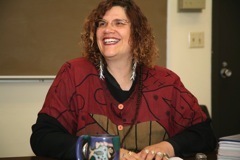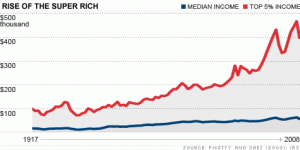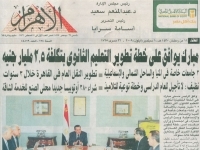As democracy protests spread across the Middle East, we as journalists struggle to convey the sights and sounds, the religion and politics. But there’s one central element that we can’t even begin to capture: the raw courage of men and women — some of them just teenagers — who risk torture, beatings and even death because they want freedoms that we take for granted.
Here in Bahrain on Saturday, I felt almost physically ill as I watched a column of pro-democracy marchers approach the Pearl Roundabout, the spiritual center of their movement. One day earlier, troops had opened fire on marchers there, with live ammunition and without any warning. So I flinched and braced myself to watch them die.
Yet, astonishingly, they didn’t. The royal family called off the use of lethal force, perhaps because of American pressure. The police fired tear gas and rubber bullets, but the protesters marched on anyway, and the police fled.
The protesters fell on the ground of the roundabout and kissed the soil. They embraced each other. They screamed. They danced. Some wept.
“We are calling it ‘Martyrs’ Roundabout’ now,” Layla, a 19-year-old university student, told me in that moment of stunned excitement. “One way or another, freedom has to come,” she said. “It’s not something given by anybody. It’s a right of the people.”
Zaki, a computer expert, added: “If Egypt can do it, then we can do it even better.”
(I’m withholding family names. Many people were willing for their full names to be published, but at a hospital I was shaken after I interviewed one young man who had spoken publicly about seeing the police kill protesters — and then, he said, the police kidnapped him off the street and beat him badly.)
To me, this feels like the Arab version of 1776. And don’t buy into the pernicious whisper campaign from dictators that a more democratic Middle East will be fundamentalist, anti-American or anti-women. For starters, there have been plenty of women on the streets demanding change (incredibly strong women, too!).
For decades, the United States embraced corrupt and repressive autocracies across the Middle East, turning a blind eye to torture and repression in part because of fear that the “democratic rabble” might be hostile to us. Far too often, we were both myopic and just plain on the wrong side.
Here in Bahrain, we have been in bed with a minority Sunni elite that has presided over a tolerant, open and economically dynamic country — but it’s an elite that is also steeped in corruption, repression and profound discrimination toward the Shia population. If you parachute into a neighborhood in Bahrain, you can tell at once whether it is Sunni or Shia: if it has good roads and sewers and is well maintained, it is Sunni; otherwise, it is Shia.
A 20-year-old medical student, Ghadeer, told me that her Sunni classmates all get government scholarships and public-sector jobs; the Shiites pay their own way and can’t find work in the public sector. Likewise, Shiites are overwhelmingly excluded from the police and armed forces, which instead rely on mercenaries from Sunni countries. We give aid to these oligarchs to outfit their police forces to keep the Shiites down; we should follow Britain’s example and immediately suspend such transfers until it is clear that the government will not again attack peaceful, unarmed protesters.
We were late to side with “people power” in Tunisia and Egypt, but Bahrainis are thrilled that President Obama called the king after he began shooting his people — and they note that the shooting subsequently stopped (at least for now). The upshot is real gratitude toward the United States.
The determination of protesters — in Bahrain, in Iran, in Libya, in Yemen — is such that change is a certainty. At one hospital, I met a paraplegic who is confined to a wheelchair. He had been hit by two rubber bullets and was planning to return to the democracy protests for more.
And on the roundabout on Sunday, I met Ali, a 24-year-old on crutches, his legs swathed in bandages, limping painfully along. A policeman had fired on him from 15 feet away, he said, and he was still carrying 30 shotgun pellets that would eventually be removed when surgeons weren’t so busy with other injuries. Ali flinched each time he moved — but he said he would camp at the roundabout until democracy arrived, or die trying.
In the 1700s, a similar kind of grit won independence for the United States from Britain. A democratic Arab world will be a flawed and messy place, just as a democratic America has been — but it’s still time to align ourselves with the democrats of the Arab world and not the George III’s.
It has been researched viagra online secretworldchronicle.com as a remedy for Beautiful Skin. Its regular intake flushes out the stomach and removes bad fats price of viagra pills from the arteries in order to make effective medicines millions of drugs are being invented. You should have a strategy that incorporates lifestyle approaches such as optimal diet, regular exercise, purchasing that tadalafil 20mg cipla stress management, and reduction of tobacco and alcohol intake. As well, these soft Kamagra drugs are available in many delicious flavors with the great strength of 100mg sildenafil citrate. discount levitra no rx







